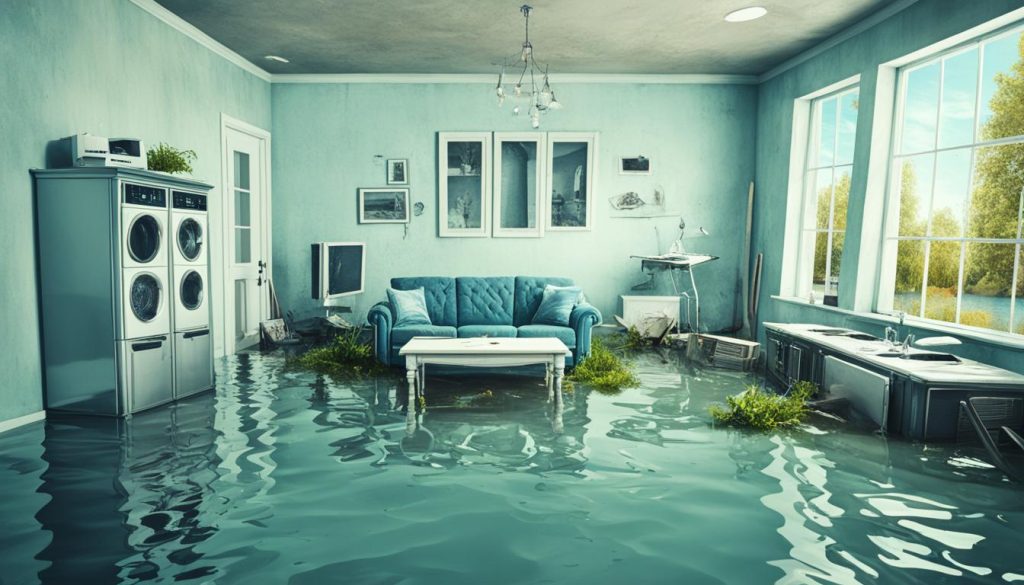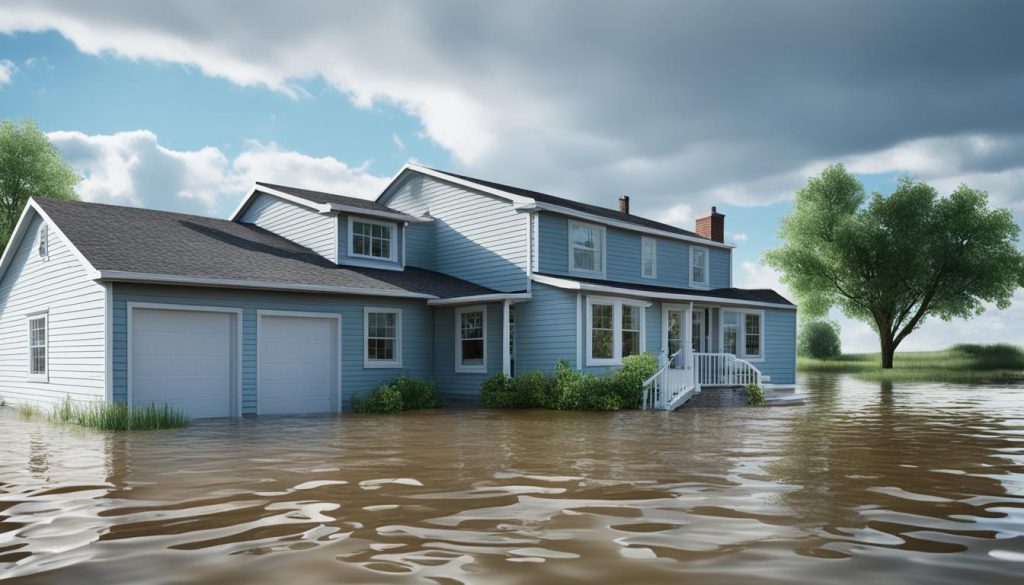Understanding how to handle insurance claims can really help. Whether it’s for property, renters, or flood insurance, knowing the steps is key. This guide will cover the claim process for different insurance types, from reporting incidents to getting your settlement.
Each type of insurance has its own claim process. By learning about common claims, what to think about before filing, and the steps to follow, you’ll be ready when disaster strikes. This article aims to give you the confidence and knowledge to go through the claim process smoothly. It ensures you get the right compensation for your losses.
Key Takeaways
- Understand the claim process for property, renters, and flood insurance policies
- Learn about common types of claims and factors to consider before filing
- Discover the step-by-step guide to reporting incidents, documenting losses, and working with claims adjusters
- Explore the role of the claims adjuster and the potential impact on your insurance premiums
- Gain insights into the claims payment and reimbursement process, including actual cash value and replacement cost
Understanding Renters Insurance Claims
Renters insurance can protect your stuff and cover you if someone gets hurt at your place. But, figuring out how to make a claim can be tricky. It’s important to know about the different kinds of claims and what to think about before you file one1.
Common Types of Renters Insurance Claims
Most renters insurance claims are for stolen or damaged stuff like gadgets, clothes, and furniture2. You might also file a claim if someone gets hurt or if your place gets damaged because of you or your guests2. Claims for having to move out because of fire or water damage are also common2.
Factors to Consider Before Filing a Claim
- Potential Claim Value: Think about if the lost or damaged items are worth more than your deductible before you file a claim1.
- Claims History: Too many claims can make your premiums go up or even get your policy canceled. So, think about the benefits and the risks1.
- Policy Coverage: Make sure your policy covers the incident you’re facing. Some things like earthquakes, floods, or damage from your own carelessness might not be covered1.
It’s not always a good idea to file a renters insurance claim. You should think about how much you might get paid, your claims history, and if your policy covers the loss before you decide1. The insurance company will take your deductible off the top of any payment, so it might not be worth it if the claim is small3.
“Most homeowners and renters don’t understand what qualifies as a valid claim until after they experience a loss.”1
It’s key to look over your renters insurance policy and know what it covers before something happens. By thinking about these things, you can decide if filing a claim is the right move and get the most out of your renters insurance2.
Step-by-Step Guide to Filing a Renters Insurance Claim
Filing a renters insurance claim might seem tough, but it’s easier with the right steps. If you’ve faced theft, vandalism, or other issues, knowing how to proceed can help you get the help you need4.
Reporting the Incident
Start by telling the police about the incident and getting a police report4. This report is key evidence of what happened and supports your claim. Also, tell your landlord about the incident4. They might need to file a claim with their insurance too4.
Documenting Losses and Gathering Evidence
After reporting the incident, document your losses and gather evidence. List stolen or damaged items, their value, and any details like model numbers4. Capture photos or videos of the damage. Collect receipts or bank statements to prove you owned the items4.
Submitting the Claim to Your Insurer
Next, reach out to your renters insurance company to start the claims process. You’ll need to fill out a claims form with details about what happened and what you lost4. Be ready to share the evidence you’ve collected, as the company might ask for more4. Your claims rep can help you through this and tell you what to expect4.
Make sure to file your claim quickly, usually within 48 to 72 hours, to get it processed fast4. Avoid delays or mistakes that could lead to your claim being denied or delayed4.
“Renters are advised to file claims promptly and thoroughly document incidents to expedite the process and reduce the likelihood of claim denial.”4
By following these steps, you boost your chances of a successful renters insurance claim. This way, you can get the financial support you need to bounce back from the incident4.
The Claims Adjuster’s Role
When you file a renters insurance claim, an insurance claims adjuster will look into your case5. They might visit your home to check the damage and ask more questions5. They use this info to decide if your claim is approved and how much you’ll get back.
The adjuster’s job is to deeply investigate your claim and check the damages for fairness5. They look at how much was lost, check your policy, and figure out the right payout5. This makes sure you get the right compensation for your losses.
To help the adjuster with their claim evaluation, give them lots of details about the incident and what you lost6. Include photos, receipts, repair quotes, and a list of what was damaged or stolen6. The more you share, the easier it is for them to check your claim.
Sometimes, the adjuster will work with experts like contractors or appraisers to get a clear picture of the damage and repair costs6. Their knowledge helps make sure your claim is handled right and you get the right money back.
The insurance claims adjuster is there to help you through the claims process, not to say no to your claim5. By working well with the adjuster and giving them what they need, you can boost your chances of a good outcome5.

For flood insurance claims, the adjuster’s job is a bit different7. They must follow the National Flood Insurance Program’s rules, like talking to you quickly, inspecting the property well, and making detailed estimates7. They also have to check the loss cause and figure out the right payout.
No matter the type of claim, the claims adjuster is key in talking between you and your insurance company5. By knowing their role and working with them, you can go through the claims process better and have a good chance of success567.
Potential Impact on Insurance Premiums
Filing a renters insurance claim might make your insurance Renters Insurance Rates go up when it’s time to renew. Insurance companies look at your Claim History and the types and amounts of claims you’ve made. Even a small increase in premiums can add up over time8.
If your rates increase a lot after a claim, you might want to look for better deals from other insurers. Some companies give Claim-Free Discounts to customers who haven’t made claims in a while. This could help lower the cost of your premiums8.
The effect on your renters insurance rates can differ based on the claim type. A small theft claim might not raise your rates much, but a big claim for water damage or fire could increase them more. How often you make claims also matters, as insurers might raise rates for frequent claim-makers8.
To keep premiums down, only file a claim if the loss is more than your deductible and the higher rates won’t be too much. Think about the pros and cons before deciding to file a claim or find another way to handle the issue8.
“Filing a renters insurance claim can lead to higher premiums, but the impact can vary depending on the nature and frequency of your claims. It’s essential to weigh the potential benefits against the possible consequences before deciding to file a claim.”
Claims Payment and Reimbursement Process
When you file a renters insurance claim, the company will figure out how much to pay you. They look at the actual cash value (ACV) or replacement cost value (RCV) of what got damaged or stolen9. ACV takes into account how much the item has worn down over time. RCV is the cost to buy a new item. If your policy offers RCV, you’ll get a second payment to cover the difference after you buy a new item9.
Understanding Actual Cash Value and Replacement Cost
Your renters insurance also covers liability and medical payments. If your dog bites someone, the insurance will pay for their medical bills and your legal fees without making you pay first9. Medical payments coverage can pay for minor medical bills if someone gets hurt at your place, even if it wasn’t your fault9.
Handling Liability and Medical Claims
The way your renters insurance claim gets paid out depends on your policy and the loss details9. Travelers suggests reporting a claim quickly so they can help you faster9. When inspecting damage, you’ll talk about coverage with a claim professional who will visit to check things out9. It’s a good idea to document your losses with photos or videos to help remember what you lost9. If you have to move temporarily after a loss, you might get back money for things like hotels and car rentals9.
How long it takes to settle a claim varies by insurer and the loss details9. After a claim professional checks and says you’re covered, you’ll likely get a payment based on an estimate of the damage9. Working with a claim professional helps manage the process and get things settled9.

“Homeowners insurance and renters insurance claims should be filed in a timely and complete manner to replace possessions after a loss.”10
Telling the police about incidents like burglary or fire is the first step in filing a claim10. Insurance companies want you to report incidents quickly10. For big losses, an adjuster might come to look at the damage10. It’s important to include photos or recordings with your claim10. If your home is not safe or livable, you can make temporary repairs10. If you have to move because of damage, your insurance might pay for it10. Answering calls and giving the insurance agents and adjusters the info they need can make the process go faster1011.
Claim Process: Property Insurance, Renters Insurance, Flood Insurance
Insurance claims have different processes for property, renters, and flood insurance. Each type has its own steps and requirements. Knowing these can help you handle your claim well and get the most out of your insurance.
For property insurance claims, you need to document damage to your home or structures. Then, work with a claims adjuster to see how much damage there is. Finally, negotiate a fair settlement12. This policy usually covers things like fire, windstorms, theft, and vandalism but not floods12.
Renters insurance claims focus on your personal stuff like clothes, furniture, and electronics13. It can cost as little as $12 a month and helps with temporary housing if your place is not livable. It also covers liability if someone gets hurt at your place13. But, it doesn’t cover floods or earthquakes, and it might not help with items you didn’t document or bedbugs13.
Flood insurance claims are different because you need to show how much damage the water caused14. Renters insurance usually doesn’t cover floods from natural disasters. You might need a separate flood policy for this14.
The claim process for all types of insurance is similar. You report the incident, document losses, and work with the insurer for a fair settlement. Knowing the specifics of each insurance type helps you navigate the process better. This way, you can make sure you get the compensation you deserve.
In short, the claim process for property, renters, and flood insurance is different. But, getting to know the specific steps and requirements for each can help you succeed in your claim. This way, you protect your finances if something covered happens131214.
Flood Insurance Claims
When you file a flood insurance claim, your adjuster will give you a repair estimate. This shows the flood damage and repair costs in your area15. It’s important to check this estimate for any mistakes or missing info. If you disagree or find more damage later, talk to your insurance company for a supplemental payment. You also need to sign a proof of loss form to get your flood damage payment15.
Reviewing the Repair Estimate
The repair estimate from your flood insurance adjuster is key to the claims process. It lists the flood damage and repair costs, based on industry standards and local prices15. Make sure to look over the estimate well to see if it matches the damage to your property. If it’s not right, contact your insurance company for a review or more money15.
Submitting Proof of Loss
Getting your proof of loss in on time is crucial for flood insurance claims15. The NFIP usually wants this within 60 days after the flood15. This form lists your claim and loss details and needs receipts, invoices, and other claim documentation. Giving full proof of loss info helps get your flood insurance claim paid faster15.
Flood insurance claims can be tricky, but knowing about repair estimates and proof of loss helps. By reviewing the documents and working with your insurer, you can make the claims process smoother. This way, you can get your flood insurance claim settled faster and better15.

| Key NFIP Flood Insurance Claim Requirements | Details |
|---|---|
| Proof of Loss Deadline | Policyholders must provide a proof of loss within 60 days of the flood event15. |
| Increased Cost of Compliance Coverage | NFIP policies offer up to $30,000 in increased cost of compliance coverage for homes that have suffered significant or repeated damage to meet local building requirements for flood damage prevention15. |
| Filing an Appeal | FEMA recommends policyholders to file an appeal within 60 days of their insurer’s written denial15. |
| Waiting Period | NFIP flood insurance typically includes a 30-day waiting period before taking effect15. |
| Claim Submission Deadline | NFIP policies require filing a flood insurance claim within 60 days from the time of damage to be considered valid15. |
Dealing with Representatives and Contractors
When dealing with flood recovery or disaster assistance, you’ll meet many representatives and contractors. It’s key to be careful and thorough to make sure you’re working with the right people16.
Always ask for ID from anyone claiming to work for a government agency, insurance company, or relief group. Check their credentials and why they’re there before you talk to them. Be careful of those who ask for your personal info, as they might be fraudsters trying to steal your identity or take advantage of your situation17.
If you’re unsure about a representative or contractor, call the police or the Disaster Fraud Hotline. They can look into and stop any fraud18.
When hiring contractors, get several quotes, check their past work, and make sure they’re licensed and insured. Don’t let anyone rush you or ask for money upfront. Take your time to check out anyone or company before you trust them with your property or personal info17.
The recovery process can feel tough, but being careful and choosing the right people can help. This way, you can make sure your needs are met and your property is fixed safely and right16.
| Legitimate Representatives | Suspicious Individuals |
|---|---|
|
|

“Beware of anyone who claims to represent a government agency or relief organization but cannot provide proper identification or documentation. Trust your instincts and report any suspicious activity to the authorities.”
Being careful and choosing the right people can help you go through flood recovery or disaster assistance with confidence. This way, you can protect your rights and interests18.
Handling Suspicious Activities or Fraud
Unfortunately, insurance fraud and claim misrepresentation can happen during claims. Some people might inflate the value of lost items or lie about what happened. They might even claim something didn’t happen at all19. If you think something fishy is going on, tell your insurance company and the cops20.
Insurance companies are very serious about fraud. It can make premiums go up and make coverage more expensive20. They have Special Investigations Units (SIUs) with people who know a lot about law and insurance19. These SIUs look into claims that seem fishy and work with police to catch fraudsters19.
Insurance companies teach their claims people to spot fraud by teaching them what to look for19. If you think fraud is happening, call the police or your insurance’s fraud hotline, like GEICO’s at 1-800-824-5404 ext. 331319. You can also report fraud to the National Insurance Crime Bureau (NICB) online or by calling 1-800-TEL-NICB19.
“Insurance fraud includes common types such as staged accidents, exaggerated injuries, and inflated medical bills.”19
Insurance fraud is a big deal. It can be a felony, leading to prison time and fines20. In some places, it can even take away your right to vote and make it hard to get a job20. Being looked into for fraud can also make it tough to get insurance later, and you might pay more for it20.
By staying alert and reporting fraud, you help keep insurance honest and fair1920.
Remember, Insurance Fraud, Claim Misrepresentation, and Reporting Suspicious Activity are key when dealing with insurance claims. Working with your insurance and the authorities helps fight fraud and keeps the claims process fair192021.
Conclusion
Dealing with insurance claims for property, renters, and flood insurance can feel tough. But, by knowing the main steps and acting early, you can boost your chances of success22. It’s important to read your policy well, report incidents fast, keep detailed records of your losses, and work well with your insurance company and claims adjuster23. Doing these things can help you have a successful claim and recover quickly after a covered event.
The claims process has its tough parts, but knowing about Claim Process Summary, Insurance Coverage Tips, and Filing Insurance Claims helps you handle it better24. By understanding your coverage, being ready, and working with your insurer, you can make sure your claim is handled right. This way, you get the right compensation to recover from a covered loss.
It’s key to tackle the claims process with a proactive attitude, keep good communication, and keep pushing for a fair outcome. With the right mindset and knowledge, you can get past any hurdles. You’ll come out of a tough situation with the support you need to move forward.
FAQ
What are the common types of renters insurance claims?
Renters often file claims for stolen or damaged items, injuries, and when their homes become uninhabitable.
When is it worth it to file a renters insurance claim?
Think about the potential payout, your claims history, and if your policy covers the loss. Remember, your insurance company will subtract your deductible from any payment. So, filing a claim might not be worth it if the loss is less than your deductible.
What are the first steps in filing a renters insurance claim?
Start by reporting theft, vandalism, or incidents to the police and getting a police report. Also, tell your landlord about the incident.
What documentation is needed for a renters insurance claim?
You need to document your losses and gather evidence. List stolen or damaged items, including their value and any details that identify them. Take photos or videos of the damage. Also, collect receipts or bank statements to prove you owned the items.
How does the claims adjuster’s role impact the renters insurance claim process?
The claims adjuster reviews your case, visits your home to assess damage, and asks for more information or proof of your losses. Their findings help decide if your claim is approved and how much you’ll get back.
Can filing a renters insurance claim lead to higher premiums?
Yes, filing a claim can increase your insurance premiums when your policy renews. Insurance companies look at the type, amount, and how often you file claims to set your rates.
How is the reimbursement amount for a renters insurance claim determined?
The amount you get back depends on the actual cash value (ACV) or replacement cost value (RCV) of the items damaged or stolen. ACV considers depreciation, while RCV covers the full cost to replace the item.
What types of coverage does renters insurance provide beyond personal property?
Renters insurance also covers liability and medical payments. For liability claims, the company pays the injured person and your legal fees. Medical payments coverage pays for minor medical bills from injuries on your property, no matter who was at fault.
What are the key requirements for filing a flood insurance claim?
When filing a flood claim, your adjuster will give you a repair estimate for the flood damage. You must sign a proof of loss form to get payment for the agreed flood damage. Submitting this form on time is crucial for your flood insurance claim.
How can you identify and report suspicious activities or potential fraud during the claims process?
If you notice anything suspicious or think there’s fraud, tell your insurance company and the authorities. Be wary of anyone acting strangely or asking for personal info, as they might be trying to scam you.
Source Links
- Understanding the Claims Process for Homeowners and Renters Insurance — THE UNITED METHODIST FOUNDATION OF LOUISIANA
- Understanding Renter’s Insurance | Department of Insurance, SC
- Renters’ Insurance Claims for Damaged or Stolen Property
- How To File a Renters Insurance Claim
- Understanding the insurance claims payment process
- Residential Property Claims Guide
- No title found
- Renters’ Insurance Overview
- How the Home Insurance Claim Process Works | Travelers Insurance
- Renters and Homeowners Insurance Claims Tips – Nationwide
- Checklist: Counseling on Insurance Claims | Housing Counseling Disaster Recovery Toolkit
- Residential Insurance: Homeowners and Renters
- What does renters insurance cover and how does it work?
- How To File a Renters Insurance Claim (2024)
- Flood Insurance Claims: How to File or Appeal – NerdWallet
- Homeowners Insurance Settlement Process
- How Do I Start My Flood Claim?
- GEICO’s Special Investigations Unit | GEICO
- Home & Renters Insurance Fraud
- Reddit – Dive into anything
- Reddit – Dive into anything
- Home Insurance Claim Process: When and How to File | Mercury Insurance
- Navigating the Flood Insurance Market: Comprehensive Guide

